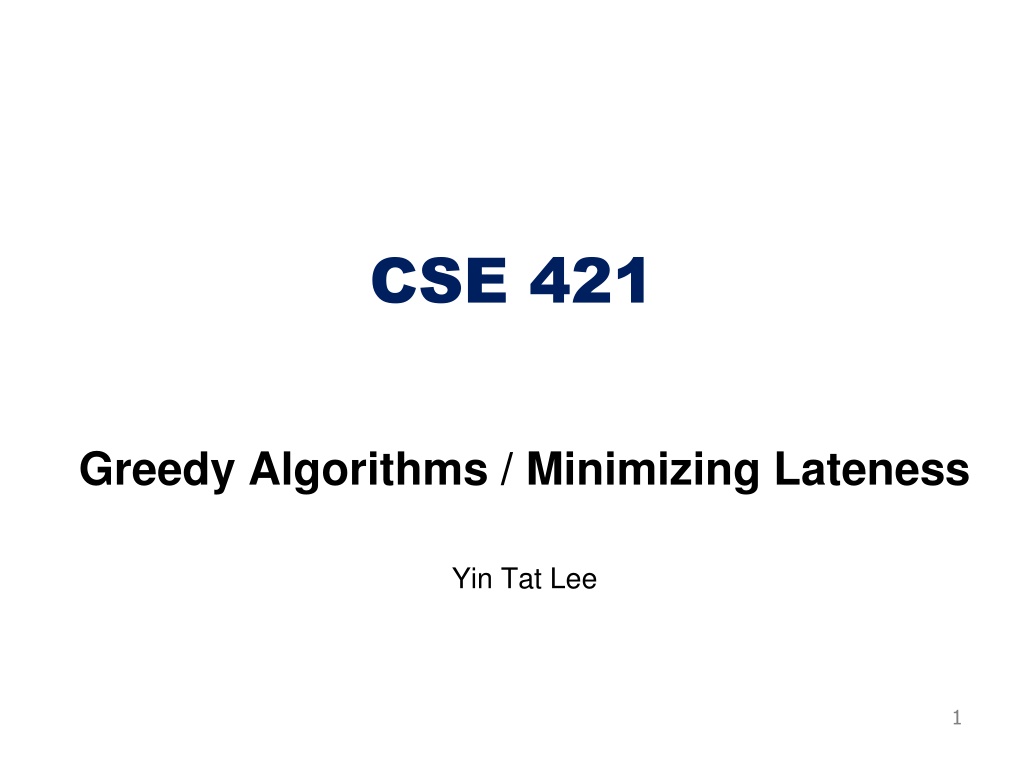
Minimizing Lateness with Greedy Algorithms
Learn about scheduling to minimize lateness using greedy algorithms. Explore concepts such as minimizing maximum lateness, scheduling based on deadlines, and optimizing job sequences. Understand the proof for the effectiveness of the greedy algorithm in minimizing lateness.
Download Presentation

Please find below an Image/Link to download the presentation.
The content on the website is provided AS IS for your information and personal use only. It may not be sold, licensed, or shared on other websites without obtaining consent from the author. If you encounter any issues during the download, it is possible that the publisher has removed the file from their server.
You are allowed to download the files provided on this website for personal or commercial use, subject to the condition that they are used lawfully. All files are the property of their respective owners.
The content on the website is provided AS IS for your information and personal use only. It may not be sold, licensed, or shared on other websites without obtaining consent from the author.
E N D
Presentation Transcript
CSE 421 Greedy Algorithms / Minimizing Lateness Yin Tat Lee 1
Scheduling to Minimizing Lateness Similar to interval scheduling. Instead of start and finish times, request ? has Time Requirement ??which must be scheduled in a contiguous block Deadline ?? by which time the request would like to be finished Requests are scheduled into time intervals [??,??] s.t. ??= ?? ??. Lateness for request ? is If ??< ??then request ? is late by??= ?? ??otherwise its lateness ??= ? Goal: Find a schedule that minimize the Maximum lateness ? = ??? ? lateness = 2 1 2 3 4 5 6 3 2 1 4 3 2 ?? 6 8 9 9 14 15 ?? ?? lateness = 0 max lateness = 6 d3 = 9 d2 = 8 d6 = 15 d1 = 6 d5 = 14 d4 = 9 12 13 14 15 0 1 2 3 4 5 6 7 8 9 10 11
Minimizing Lateness: Greedy Algorithms Greedy template. Consider jobs in some order. [Shortest processing time first] Consider jobs in ascending order of processing time ??. 1 2 tj 1 10 dj 100 10 [Smallest slack] Consider jobs in ascending order of slack ?? ??. counterexample 1 2 1 10 tj dj 2 10 counterexample [Earliest deadline first] Consider jobs in ascending order of deadline ??. 3
Greedy Algorithm: Earliest Deadline First Sort deadlines in increasing order (?? ?? ??) ? ? for ? ? to ? to ?? ? ?? ??+ ?? ? ?? end for 1 2 3 4 5 6 3 2 1 4 3 2 ?? 6 8 9 9 14 15 ?? max lateness = 1 d1 = 6 d2 = 8 d3 = 9 d4 = 9 d5 = 14 d6 = 15 12 13 14 15 0 1 2 3 4 5 6 7 8 9 10 11 4
Minimizing Lateness: No Idle Time Observation. There exists an optimal schedule with no idle time. d = 4 d = 6 d = 12 0 1 2 3 4 5 6 7 8 9 10 11 d = 4 d = 6 d = 12 0 1 2 3 4 5 6 7 8 9 10 11 Observation. The greedy schedule has no idle time. 5
Proof for Greedy Algorithm: Exchange Argument We will show that if there is another schedule ? (think optimal schedule) then we can gradually change ? so that at each step the maximum lateness in ? never gets worse. it eventually becomes the same cost as ? (by greedy). 6
Minimizing Lateness: Inversions Definition An adjacent inversion in schedule ? is a pair of jobs? and ? such that ??< ?? Job ? is scheduled immediately after Job ? inversion j i before swap Observation Greedy schedule has no adjacent inversions. 7
Minimizing Lateness: Inversions Definition An adjacent inversion in schedule ? is a pair of jobs? and ? such that ??< ?? Job ? is scheduled immediately after Job ? inversion ?? j i before swap i j after swap ?? Claim Swapping two adjacent, inverted jobs reduces the number of inversions by one and does not increase the max lateness. 8
Minimizing Lateness: Inversions Lemma: Swapping two adjacent, inverted jobs does not increase the maximum lateness. inversion ?? j i before swap i j after swap ?? Proof: Let ? be the schedule after swapping. Lateness ?? ??since ? is scheduled earlier in ? than in ? Requests ? and ? together occupy the same total time slot in both schedules All other requests ? ?,? have ?? = ?? ?? = ??so ?? Maximum lateness has not increased! = ?? ??= ?? ??< ?? ??= ?? 9
Optimal schedules and inversions Claim: There is an optimal schedule with no idle time and no inversions Proof: By previous argument there is an optimal schedule ? with no idle time If ? has an inversion then it has a consecutive pair of requests in its schedule that are inverted and can be swapped without increasing lateness Eventually these swaps will produce an optimal schedule with no inversions Each swap decreases the number of inversions by 1 There are at most ?(? ?)/? inversions. (we only care that this is finite.) 14
Idleness and Inversions are the only issue Claim: All schedules with no inversions and no idle time have the same maximum lateness Proof: Schedules can differ only in how they order requests with equal deadlines Consider all requests having some common deadline ? Maximum lateness of these jobs is based only on the finish time of the last of these jobs but the set of these requests occupies the same time segment in both schedules Last of these requests finishes at the same time in any such schedule. 11
Why Exchange Argument? Greedy cannot handle problems with many local minimum. Let ? be any solution and ? be the solution given by greedy. Exchange argument gives a sequence ? ?1 ?2 ?3 ? such that each solution is close to the another solution the solution is improving. It basically proves that there is no local min. 12
CSE 421 Greedy Algorithms / Caching Problem Yin Tat Lee 13
Optimal Caching/Paging Memory systems Many levels of storage with different access times Smaller storage has shorter access time To access an item it must be brought to the lowest level of the memory system Consider the problem between 2 levels Main memory with ? data items Cache can hold ? < ? items Assume no restrictions about where items can be Suppose cache is full initially Holds ? data items to start with 14
Optimal Offline Caching Caching Cache with capacity to store ? items. Sequence of ? item requests ??,??, ,??. Cache hit: item already in cache when requested. Cache miss: item not already in cache when requested: must bring requested item into cache, and evict some existing item, if full. a a b Goal of evictions. a b b Eviction schedule that minimizes number c b c c b b c b c Example:? = ?, initial cache = ?,?, requests: ?,?,?,?,?,?,?,?. a b a a b a a cache b b requests Optimal eviction schedule: ? cache misses. Why 2 is optimal? 15
Optimal Offline Caching: Farthest-In-Future Which item we should evict? Farthest-in-future Evict item in the cache that is not requested until farthest in the future. current cache: c d e f a b future queries: g a b c e d a b b a c d e a f a d e f g h ... eject this one cache miss Theorem [Bellady, 1960s] FIF is an optimal eviction schedule. Exchange Argument We can swap choices to convert other schedules to Farthest-In-Future without losing quality 16
Warm up (? = ? + 1) Farthest-in-future Evict item in the cache that is not requested until farthest in the future. current cache: c d e f a b future queries: g a b c e d a b b a c d e a f a d e f g h ... eject this one cache miss When ? = ? + 1, between the cache miss and the farthest-item in the future, g a b c e d a b b a c d e a f contains all the item. Hence, any algorithm must miss once. 17
Online Caching Online vs. offline algorithms. Offline: full sequence of requests is known a priori. Online (reality): requests are not known in advance. Caching is among most fundamental online problems in CS. LIFO. Evict page brought in most recently. LRU. Evict page whose most recent access was earliest. FIF with direction of time reversed! Theorem. FIF is optimal offline eviction algorithm. Provides basis for understanding and analyzing online algorithms. LRU is k-competitive. [Section 13.8] LIFO is arbitrarily bad. 18












